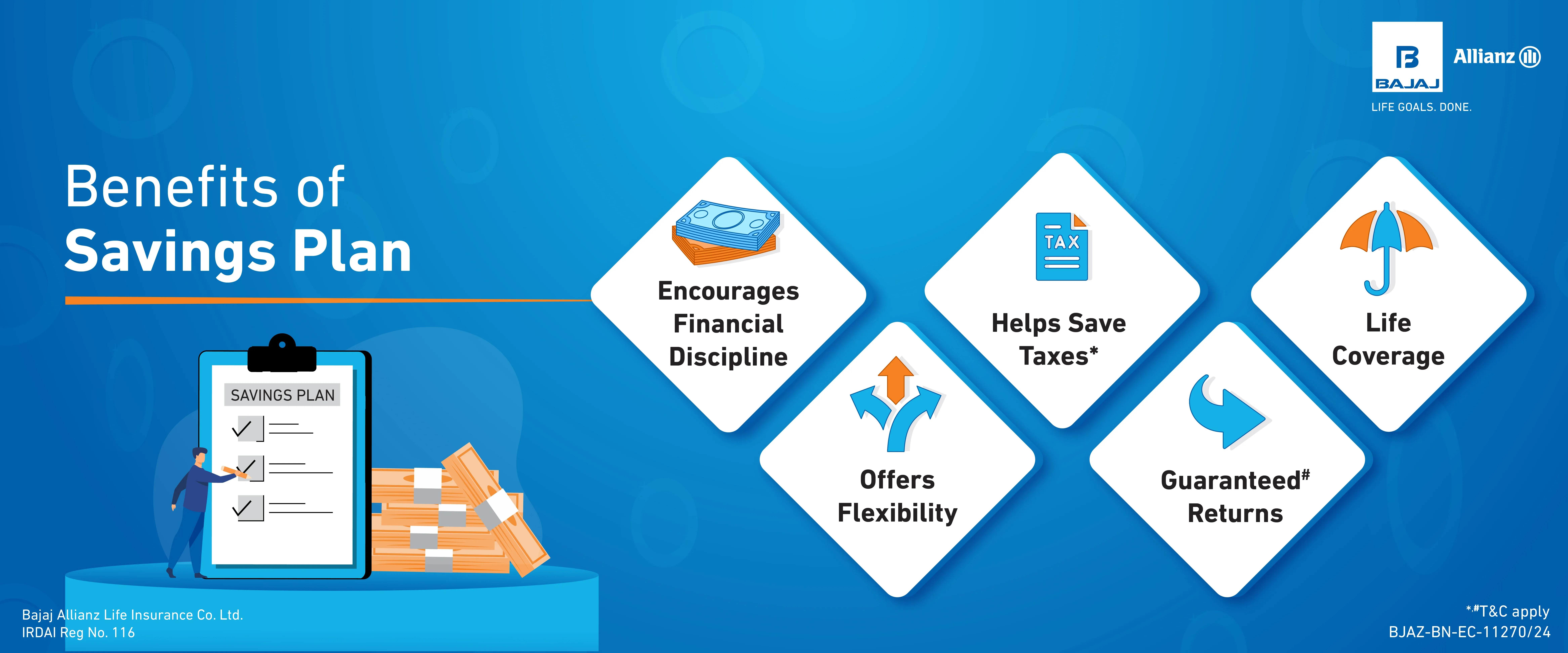Why Do You Need A Savings Plan?
A savings plan can be beneficial for several reasons. Some such reasons are as follows:
- Promotes savings:
As the name implies, savings plans assist you in saving for your financial goals. You can accumulate a corpus for your financial needs by investing in savings plans. - Products are low-risk:
Many savings plans, except those linked to market performance, provide assured returns on investments. Such plans are not exposed to market volatility allow you to build a safe and steady corpus without the risk of volatile markets. - Adds to the corpus:
The returns offered under savings plans add to your investments and help them grow. This helps you accumulate and get a good corpus on maturity or even during the plan’s tenure for your financial needs. - Offer insurance cover:
If you choose savings plans offered by life insurance companies, you can enjoy financial protection against the risk of premature demise. Such plans pay a death benefit if the life assured passes away during the policy term. This helps the family meet their financial needs even when the breadwinner is not around. Moreover, the family can use the death benefit to fulfil the goals which you could not fulfil. - Loan facility:
Savings plans are a type of asset. They can be used as a collateral security to get a loan. Moreover, life insurance savings plans also offer policy loans against the available surrender value. This loan provides you with the funds you require without the need to exit the policy. - Tax benefits.
Finally, the tax benefits provided by savings plans are the icing on the cake. The following are the advantages that you receive: - Section 80C of the Income Tax Act of 1961 allows for a deduction for investments made in different types of savings plans. The maximum deduction permitted is ₹1.5 lakhs.. Common savings plans which allow the benefit under Section 80C include life insurance savings plans, 5-year fixed deposits, PPF, NPS, etc.
- Under life insurance savings plans, the death benefit received is allowed as a tax-free benefit.
- Many savings plans also offer tax-free maturity benefits. For instance, the maturity proceeds from life insurance plans are allowed as a tax-free benefit under Section 10(10D)
How Do You Choose The Right Savings Plan?
Here are some guidelines for selecting the best savings plan –
- Assess your financial goals: Determine what you hope to achieve with your savings plan.
- Evaluate your risk tolerance. Consider how comfortable you are with risk and volatility. If you are risk-averse, you may select a saving plan that provides a guaranteed return or a lower-risk investment alternative. If you are willing to take on additional risk, you could choose a plan with a higher potential return.
- Select a savings plan that provides good returns to help you create a good corpus.
- Consider your income and expenses: Calculate how much you can afford to save each month. Make sure you understand your financial obligations, including debts, bills, and living expenses.
- Ensure the savings plan’s benefits align with your financial needs.
- Assess the tax benefits of savings plans and choose plans which give maximum tax savings.
How To Compare Saving Plans In India?
When comparing the best saving plan in India, it is important to consider a variety of variables to ensure that you select a plan that aligns with your financial objectives, risk tolerance, and personal circumstances. Following are a few steps to consider while comparing the best saving plan in India:
- Determine your goals. Identify your financial goals, such as saving for a specific purpose, establishing an emergency fund, or protecting your family.
- Research: Look for the different options for savings plans in India. Choose an option that matches your needs and requirements.
- Comparing returns – Check the returns offered by different savings plans. Choose a plan offering the highest possible return for maximum savings.
- Compare plan features: Evaluate the features of the different savings plans, i.e., the investment amount, investment tenure, expected returns, liquidity, risk, etc.
- Tax benefits – Compare the savings plans on their tax angle. Check the tax implication on investment, returns and maturity proceeds.

Who Should Buy A Term Insurance Policy?
A term insurance policy may act as a financial cushion for a family when an earning member succumbs to a sudden death. The sum assured paid to the nominee can be utilized to sail through the financial crisis by taking care of household needs, repaying debts, and funding life goals. So, if you are someone who has dependent parents or an immediate family, liabilities, and life goals to be fulfilled, term life insurance may be a worthy choice to consider.It may help you create a financial shield for your loved ones that would help them sustain if you are suddenly not there anymore.
How Does A Term Plan Work?
Now that you know what a term plan is, it’s time to understand how it functions before you decide to purchase one. A term insurance policy is basically a contract between two parties—the insurance company and the insured (policyholder). Here, the insured pays premiums, a pre-fixed amount payable in a specific schedule for the specified term of the policy, typically 10, 20, or 30 years. The premium, in a monthly, quarterly, half yearly or yearly payment schedule is charged by the insurer, to provide the insured with a death benefit or any other applicable benefit in exchange. The amount of premium is calculated depending on the policyholder’s age, gender, medical history, occupation, lifestyle, and habits alongside the chosen sum assured, policy term, and riders and usually remains fixed throughout the policy term. If the insured dies before the expiry of the policy, his/her nominee receive the entitled sum assured as a death benefit. But no payment is made by the insurer if the life assured survives the policy term and the coverage of the policy ends with its expiry date. However, the coverage period can be extended, by renewing the policy, but at a revised premium based on the age of the insured at the time of the policy renewal. The premium thus, gets increased as the age increases.
Benefits Of Buying Term Insurance
Now that you know what a term plan is, it’s time to understand how it functions before you decide to purchase one. A term insurance policy is basically a contract between two parties—the insurance company and the insured (policyholder). Here, the insured pays premiums, a pre-fixed amount payable in a specific schedule for the specified term of the policy, typically 10, 20, or 30 years. The premium, in a monthly, quarterly, half yearly or yearly payment schedule is charged by the insurer, to provide the insured with a death benefit or any other applicable benefit in exchange. The amount of premium is calculated depending on the policyholder’s age, gender, medical history, occupation, lifestyle, and habits alongside the chosen sum assured, policy term, and riders and usually remains fixed throughout the policy term. If the insured dies before the expiry of the policy, his/her nominee receive the entitled sum assured as a death benefit. But no payment is made by the insurer if the life assured survives the policy term and the coverage of the policy ends with its expiry date. However, the coverage period can be extended, by renewing the policy, but at a revised premium based on the age of the insured at the time of the policy renewal. The premium thus, gets increased as the age increases.
Benefits Of Buying Term Insurance
With a bunch of benefits, term insurance may be one of the worthy investment choices for those looking to financially secure their loved ones’ future. Here’s how
Extensive Coverage at Low Premiums:
Since there are no maturity benefits to be paid, insurance companies offer term insurances for much lower premiums. Hence, you may be able to get a large and extensive coverage, keeping it easy on your pockets too.
Tax Deductions for the Policyholder:
Premium payment for term insurance entitles the policyholder to get tax benefits. Under Section 80C of the Income Tax Act, 1961, he/she can get a tax deduction of up to Rs 1.5 lakhs annually for the premiums paid. However, this can only be availed under the old tax regime.
Tax-free Benefit:
The death benefit received by the nominee of the policyholder in the event of the unforeseen is completely tax-free under Section 10(10D) of the Income Tax Act, 1961.
Peace of Mind:
Everyone looks forward to keeping the loved ones safe from any financial struggle, even when he/she is no more. Term insurance may put the worries to an end by offering a scope to secure the family’s financial future.
